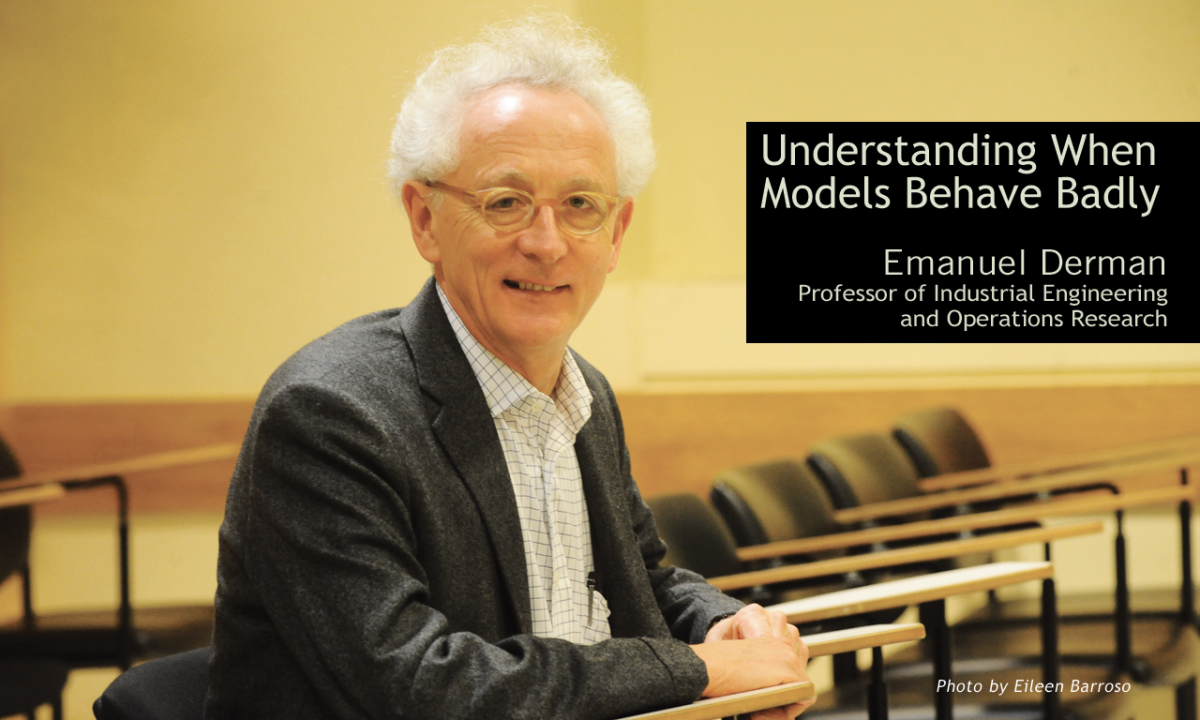Industrial Engineering and Operations Research
313 S. W. Mudd, MC 4704
Phone: 212-854-2941
ieor.columbia.edu
Industrial engineering is the branch of the engineering profession that is concerned with the design, analysis, and control of production and service systems. Originally, an industrial engineer worked in a manufacturing plant and was involved only with the operating efficiency of workers and machines. Today, industrial engineers are more broadly concerned with productivity and all of the technical problems of production management and control. They may be found in every kind of organization: manufacturing, distribution, transportation, mercantile, and service. Their responsibilities range from the design of unit operations to that of controlling complete production and service systems. Their jobs involve the integration of the physical, financial, economic, computer, and human components of such systems to attain specified goals. Industrial engineering includes activities such as production planning and control; quality control; inventory, equipment, warehouse, and materials management; plant layout; and workstation design.
 Operations research is concerned with quantitative decision problems, generally involving the allocation and control of limited resources. Such problems arise, for example, in the operations of industrial firms, financial institutions, health care organizations, transportation systems, and government. The operations research analyst develops and uses mathematical and statistical models to help solve these decision problems. Like engineers, they are problem formulators and solvers. Their work requires the formation of a mathematical model of a system and the analysis and prediction of the consequences of alternate modes of operating the system. The analysis may involve mathematical optimization techniques, probabilistic and statistical methods, experiments, and computer simulations.
Operations research is concerned with quantitative decision problems, generally involving the allocation and control of limited resources. Such problems arise, for example, in the operations of industrial firms, financial institutions, health care organizations, transportation systems, and government. The operations research analyst develops and uses mathematical and statistical models to help solve these decision problems. Like engineers, they are problem formulators and solvers. Their work requires the formation of a mathematical model of a system and the analysis and prediction of the consequences of alternate modes of operating the system. The analysis may involve mathematical optimization techniques, probabilistic and statistical methods, experiments, and computer simulations.
Management Science and Engineering (also known as Engineering Management Systems) is a multidisciplinary field in industrial engineering, operations research, contemporary technology, business, economics, and management. It provides a foundation for decision making and managing risks in complex systems.
Financial engineering is a multidisciplinary field integrating financial theory with economics, methods of engineering, tools of mathematics, and practice of programming. The field provides training in the application of engineering methodologies and quantitative methods of finance.
Business Analytics involves the use of data science tools for solving operational and marketing problems. Students learn to leverage advanced quantitative models, algorithms, and data for making actionable decisions to improve business operations.
Current Research Activities
In industrial engineering, research is conducted in the area of logistics, routing, scheduling, production and supply chain management, inventory control, revenue management, and quality control.
In operations research, new developments are being explored in mathematical programming, combinatorial optimization, stochastic modeling, computational and mathematical finance, queueing theory, reliability, simulation, and both deterministic and stochastic network flows.
In engineering and management systems, research is conducted in the areas of logistics, supply chain optimization, and revenue and risk management.
In financial engineering, research is being carried out in portfolio management; option pricing, including exotic and real options; computational finance, such as Monte Carlo simulation and numerical methods; as well as data mining and risk management.
Projects are sponsored and supported by leading private firms and government agencies. In addition, our students and faculty are involved in the work of three research and educational centers: the Center for Applied Probability (CAP), the Center for Financial Engineering (CFE), and the Computational and Optimization Research Center (CORC), and the FDT Center for Intelligent Asset Management.
The Center for Applied Probability (CAP) is a cooperative center involving the School of Engineering and Applied Science, several departments in the Graduate School of Arts and Sciences, and Columbia Business School. Its interests are in four applied areas: mathematical and computational finance, stochastic networks, logistics and distribution, and population dynamics.
The Center for Financial Engineering (CFE) at Columbia University encourages interdisciplinary research on financial engineering and mathematical modeling in finance and promoting collaboration between Columbia faculty and financial institutions, through the organization of research seminars, workshops, and the dissemination of research done by members of the Center.
The Computational Optimization Research Center (CORC) at Columbia University is an interdisciplinary group of researchers from a variety of departments on the Columbia campus. Its permanent members are Professors Daniel Bienstock, Don Goldfarb, Garud Iyengar, Jay Sethuraman, and Cliff Stein, from the Industrial Engineering and Operations Research Department, and Professor David Bayer, from the Department of Mathematics at Barnard College. Researchers at CORC specialize in the design and implementation of state-of-the-art algorithms for the solution of large-scale optimization problems arising from a wide variety of industrial and commercial applications.
The FDT Center for Intelligent Asset Management is led by Professor Xunyu Zhou at Columbia University. The Center will focus on the exploration of theoretical underpinnings and modeling strategies for financial portfolio management through the introduction of big data analytical techniques. The Center's research will combine modern portfolio theory, behavioral finance, machine learning and data science to study core problems including optimal asset allocation and risk management; and the research of the Center sits at the crossroad of financial engineering, computer science, statistics, and finance, aiming at providing innovative and intelligent investment solutions.